Organizational Behavior Analysis: BBC Case Study Report
VerifiedAdded on 2021/01/02
|22
|5774
|109
Report
AI Summary
This report provides an in-depth analysis of organizational behavior within the British Broadcasting Corporation (BBC). It explores the application of organizational culture theories, including Handy's Typology and Hofstede's Work, to understand the cultural dynamics within the organization. The report examines power structures and political behaviors of managers, assessing their impact on team performance. It further delves into motivation theories, such as content and process theories, including Maslow's hierarchy of needs, to identify strategies for enhancing employee motivation and achieving organizational goals. The report also discusses different types of teams and factors that contribute to effective teamwork within BBC, along with barriers to effective performance. Overall, the report provides a comprehensive overview of organizational behavior principles and their practical application within a real-world case study.
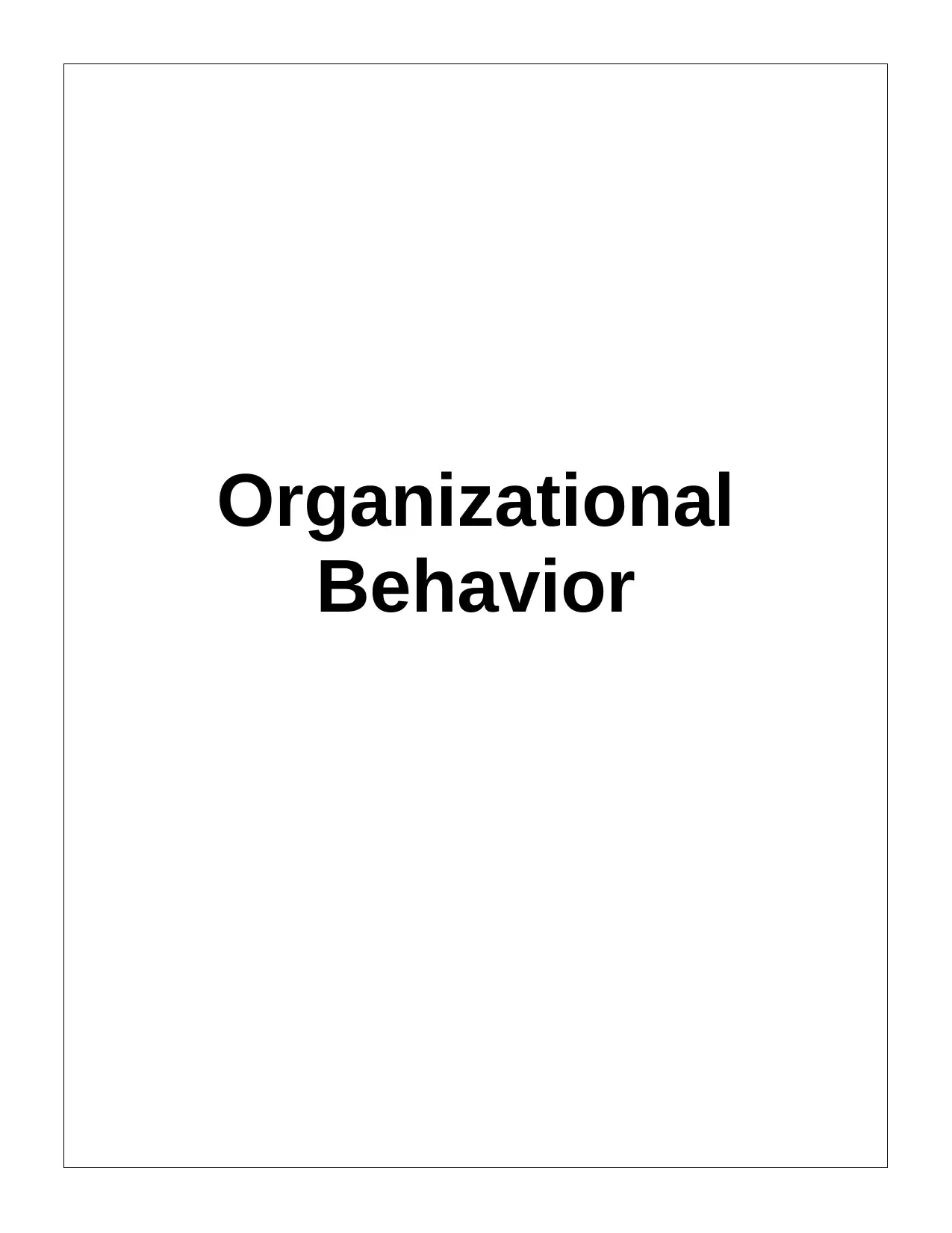
Organizational
Behavior
Behavior
Paraphrase This Document
Need a fresh take? Get an instant paraphrase of this document with our AI Paraphraser
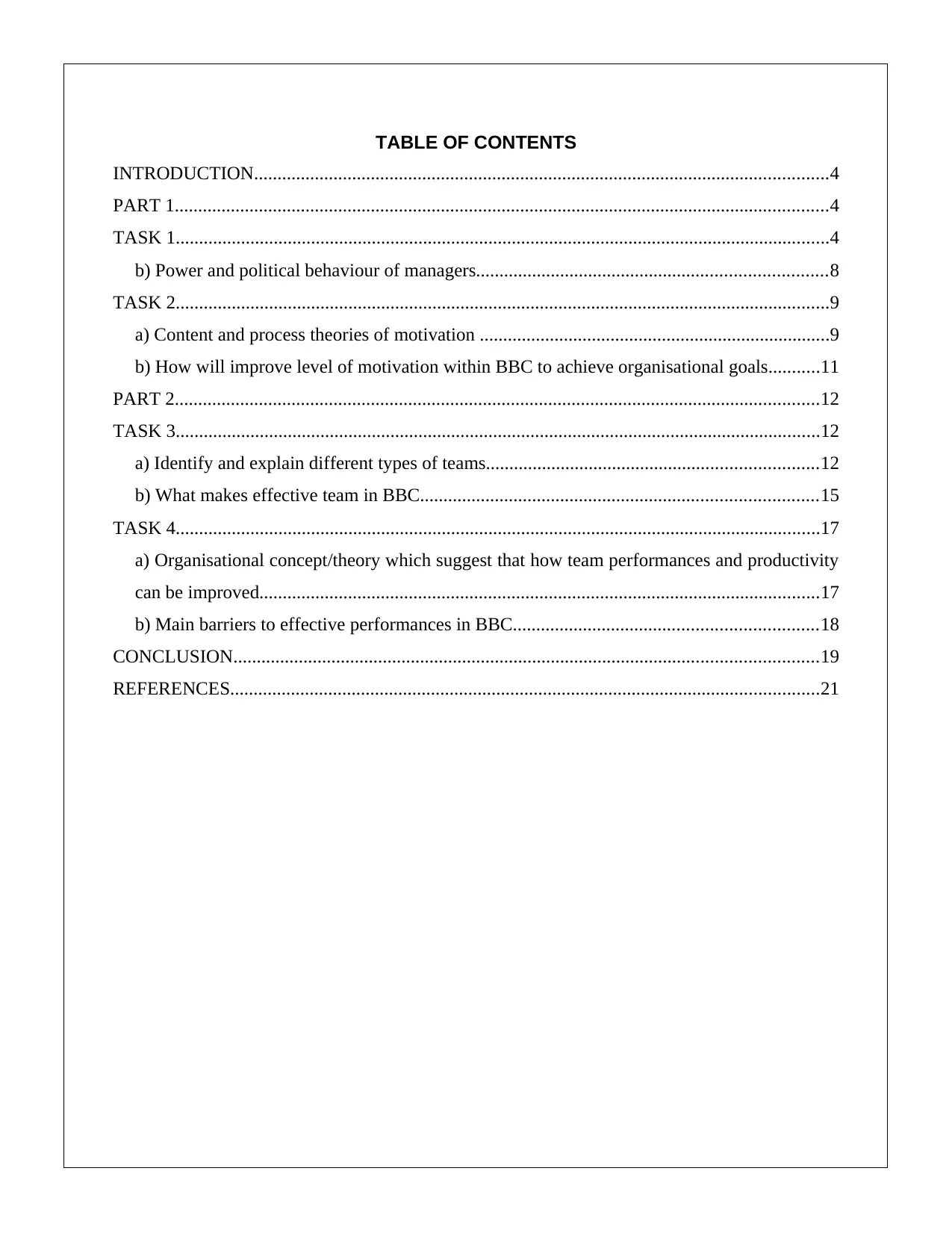
TABLE OF CONTENTS
INTRODUCTION...........................................................................................................................4
PART 1............................................................................................................................................4
TASK 1............................................................................................................................................4
b) Power and political behaviour of managers...........................................................................8
TASK 2............................................................................................................................................9
a) Content and process theories of motivation ...........................................................................9
b) How will improve level of motivation within BBC to achieve organisational goals...........11
PART 2..........................................................................................................................................12
TASK 3..........................................................................................................................................12
a) Identify and explain different types of teams.......................................................................12
b) What makes effective team in BBC.....................................................................................15
TASK 4..........................................................................................................................................17
a) Organisational concept/theory which suggest that how team performances and productivity
can be improved........................................................................................................................17
b) Main barriers to effective performances in BBC.................................................................18
CONCLUSION.............................................................................................................................19
REFERENCES..............................................................................................................................21
INTRODUCTION...........................................................................................................................4
PART 1............................................................................................................................................4
TASK 1............................................................................................................................................4
b) Power and political behaviour of managers...........................................................................8
TASK 2............................................................................................................................................9
a) Content and process theories of motivation ...........................................................................9
b) How will improve level of motivation within BBC to achieve organisational goals...........11
PART 2..........................................................................................................................................12
TASK 3..........................................................................................................................................12
a) Identify and explain different types of teams.......................................................................12
b) What makes effective team in BBC.....................................................................................15
TASK 4..........................................................................................................................................17
a) Organisational concept/theory which suggest that how team performances and productivity
can be improved........................................................................................................................17
b) Main barriers to effective performances in BBC.................................................................18
CONCLUSION.............................................................................................................................19
REFERENCES..............................................................................................................................21
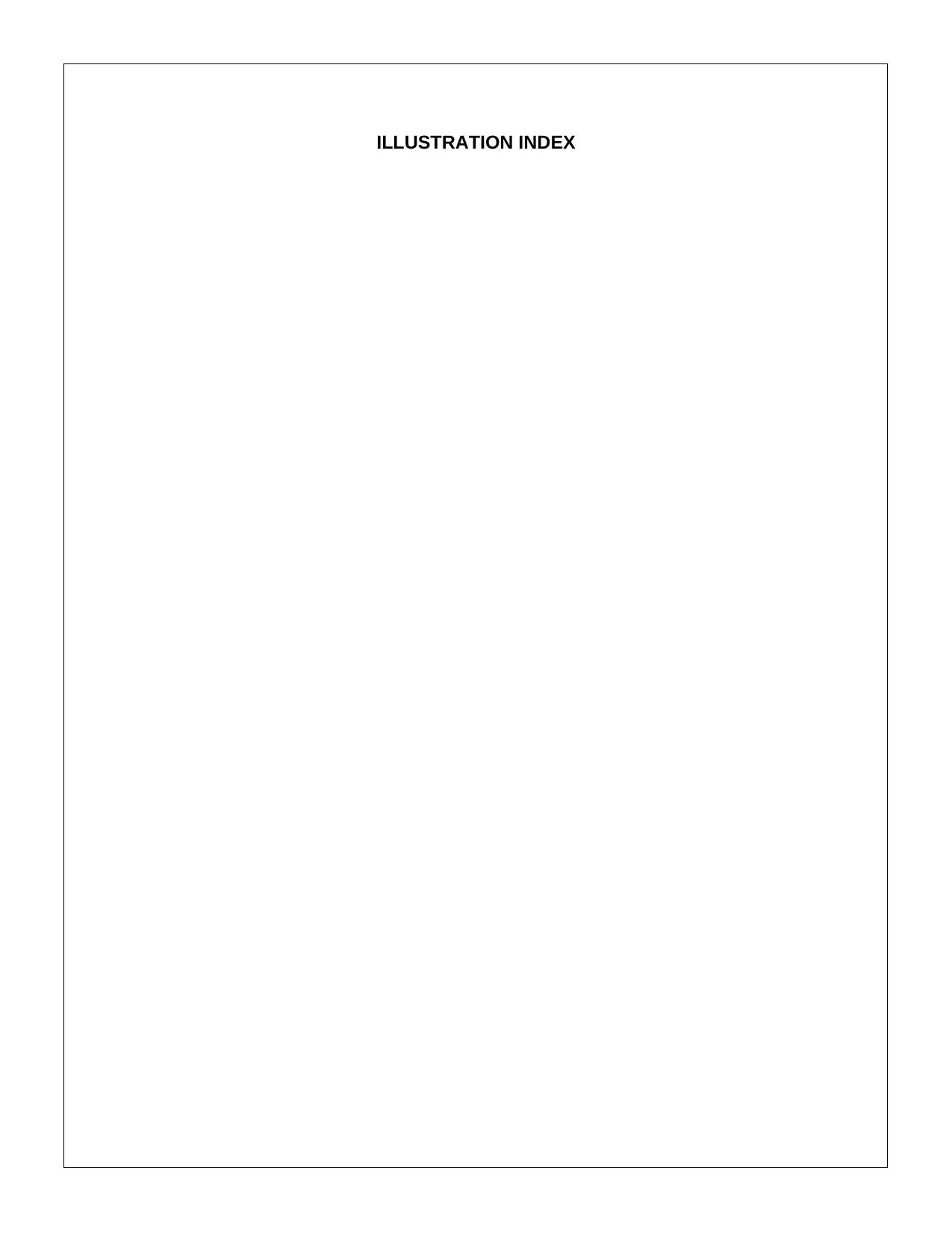
ILLUSTRATION INDEX
⊘ This is a preview!⊘
Do you want full access?
Subscribe today to unlock all pages.

Trusted by 1+ million students worldwide
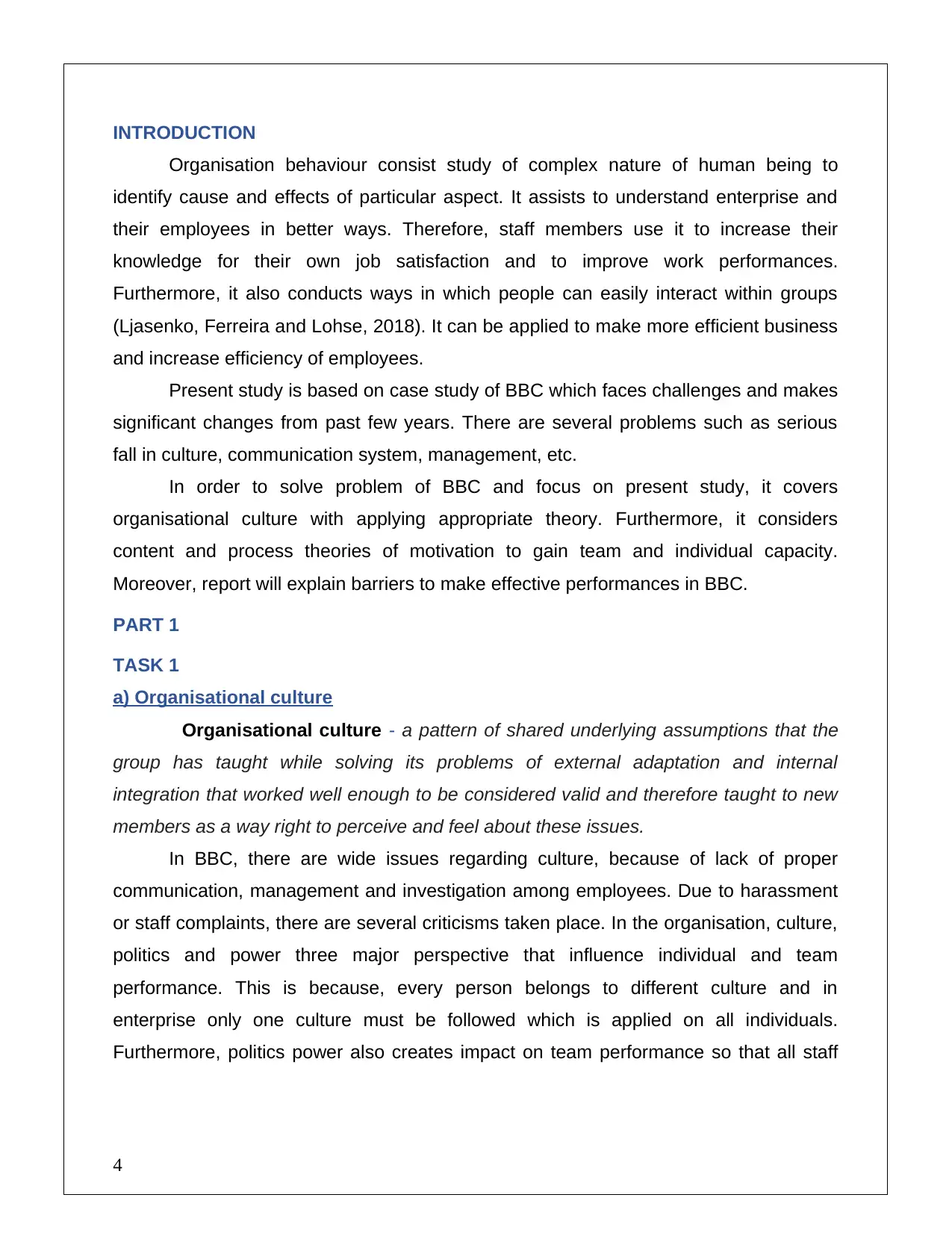
INTRODUCTION
Organisation behaviour consist study of complex nature of human being to
identify cause and effects of particular aspect. It assists to understand enterprise and
their employees in better ways. Therefore, staff members use it to increase their
knowledge for their own job satisfaction and to improve work performances.
Furthermore, it also conducts ways in which people can easily interact within groups
(Ljasenko, Ferreira and Lohse, 2018). It can be applied to make more efficient business
and increase efficiency of employees.
Present study is based on case study of BBC which faces challenges and makes
significant changes from past few years. There are several problems such as serious
fall in culture, communication system, management, etc.
In order to solve problem of BBC and focus on present study, it covers
organisational culture with applying appropriate theory. Furthermore, it considers
content and process theories of motivation to gain team and individual capacity.
Moreover, report will explain barriers to make effective performances in BBC.
PART 1
TASK 1
a) Organisational culture
Organisational culture - a pattern of shared underlying assumptions that the
group has taught while solving its problems of external adaptation and internal
integration that worked well enough to be considered valid and therefore taught to new
members as a way right to perceive and feel about these issues.
In BBC, there are wide issues regarding culture, because of lack of proper
communication, management and investigation among employees. Due to harassment
or staff complaints, there are several criticisms taken place. In the organisation, culture,
politics and power three major perspective that influence individual and team
performance. This is because, every person belongs to different culture and in
enterprise only one culture must be followed which is applied on all individuals.
Furthermore, politics power also creates impact on team performance so that all staff
4
Organisation behaviour consist study of complex nature of human being to
identify cause and effects of particular aspect. It assists to understand enterprise and
their employees in better ways. Therefore, staff members use it to increase their
knowledge for their own job satisfaction and to improve work performances.
Furthermore, it also conducts ways in which people can easily interact within groups
(Ljasenko, Ferreira and Lohse, 2018). It can be applied to make more efficient business
and increase efficiency of employees.
Present study is based on case study of BBC which faces challenges and makes
significant changes from past few years. There are several problems such as serious
fall in culture, communication system, management, etc.
In order to solve problem of BBC and focus on present study, it covers
organisational culture with applying appropriate theory. Furthermore, it considers
content and process theories of motivation to gain team and individual capacity.
Moreover, report will explain barriers to make effective performances in BBC.
PART 1
TASK 1
a) Organisational culture
Organisational culture - a pattern of shared underlying assumptions that the
group has taught while solving its problems of external adaptation and internal
integration that worked well enough to be considered valid and therefore taught to new
members as a way right to perceive and feel about these issues.
In BBC, there are wide issues regarding culture, because of lack of proper
communication, management and investigation among employees. Due to harassment
or staff complaints, there are several criticisms taken place. In the organisation, culture,
politics and power three major perspective that influence individual and team
performance. This is because, every person belongs to different culture and in
enterprise only one culture must be followed which is applied on all individuals.
Furthermore, politics power also creates impact on team performance so that all staff
4
Paraphrase This Document
Need a fresh take? Get an instant paraphrase of this document with our AI Paraphraser
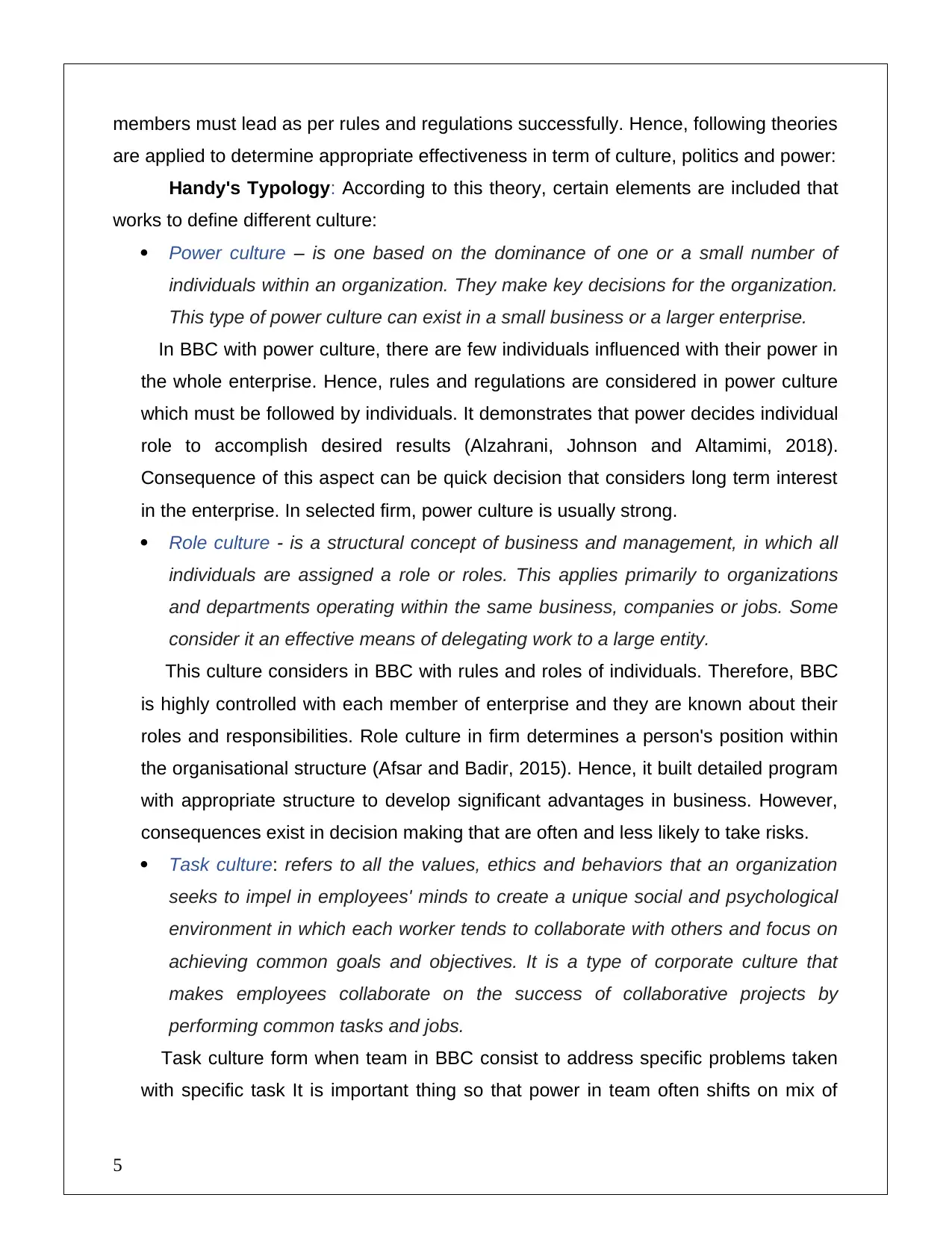
members must lead as per rules and regulations successfully. Hence, following theories
are applied to determine appropriate effectiveness in term of culture, politics and power:
Handy's Typology: According to this theory, certain elements are included that
works to define different culture:
Power culture – is one based on the dominance of one or a small number of
individuals within an organization. They make key decisions for the organization.
This type of power culture can exist in a small business or a larger enterprise.
In BBC with power culture, there are few individuals influenced with their power in
the whole enterprise. Hence, rules and regulations are considered in power culture
which must be followed by individuals. It demonstrates that power decides individual
role to accomplish desired results (Alzahrani, Johnson and Altamimi, 2018).
Consequence of this aspect can be quick decision that considers long term interest
in the enterprise. In selected firm, power culture is usually strong.
Role culture - is a structural concept of business and management, in which all
individuals are assigned a role or roles. This applies primarily to organizations
and departments operating within the same business, companies or jobs. Some
consider it an effective means of delegating work to a large entity.
This culture considers in BBC with rules and roles of individuals. Therefore, BBC
is highly controlled with each member of enterprise and they are known about their
roles and responsibilities. Role culture in firm determines a person's position within
the organisational structure (Afsar and Badir, 2015). Hence, it built detailed program
with appropriate structure to develop significant advantages in business. However,
consequences exist in decision making that are often and less likely to take risks.
Task culture: refers to all the values, ethics and behaviors that an organization
seeks to impel in employees' minds to create a unique social and psychological
environment in which each worker tends to collaborate with others and focus on
achieving common goals and objectives. It is a type of corporate culture that
makes employees collaborate on the success of collaborative projects by
performing common tasks and jobs.
Task culture form when team in BBC consist to address specific problems taken
with specific task It is important thing so that power in team often shifts on mix of
5
are applied to determine appropriate effectiveness in term of culture, politics and power:
Handy's Typology: According to this theory, certain elements are included that
works to define different culture:
Power culture – is one based on the dominance of one or a small number of
individuals within an organization. They make key decisions for the organization.
This type of power culture can exist in a small business or a larger enterprise.
In BBC with power culture, there are few individuals influenced with their power in
the whole enterprise. Hence, rules and regulations are considered in power culture
which must be followed by individuals. It demonstrates that power decides individual
role to accomplish desired results (Alzahrani, Johnson and Altamimi, 2018).
Consequence of this aspect can be quick decision that considers long term interest
in the enterprise. In selected firm, power culture is usually strong.
Role culture - is a structural concept of business and management, in which all
individuals are assigned a role or roles. This applies primarily to organizations
and departments operating within the same business, companies or jobs. Some
consider it an effective means of delegating work to a large entity.
This culture considers in BBC with rules and roles of individuals. Therefore, BBC
is highly controlled with each member of enterprise and they are known about their
roles and responsibilities. Role culture in firm determines a person's position within
the organisational structure (Afsar and Badir, 2015). Hence, it built detailed program
with appropriate structure to develop significant advantages in business. However,
consequences exist in decision making that are often and less likely to take risks.
Task culture: refers to all the values, ethics and behaviors that an organization
seeks to impel in employees' minds to create a unique social and psychological
environment in which each worker tends to collaborate with others and focus on
achieving common goals and objectives. It is a type of corporate culture that
makes employees collaborate on the success of collaborative projects by
performing common tasks and jobs.
Task culture form when team in BBC consist to address specific problems taken
with specific task It is important thing so that power in team often shifts on mix of
5
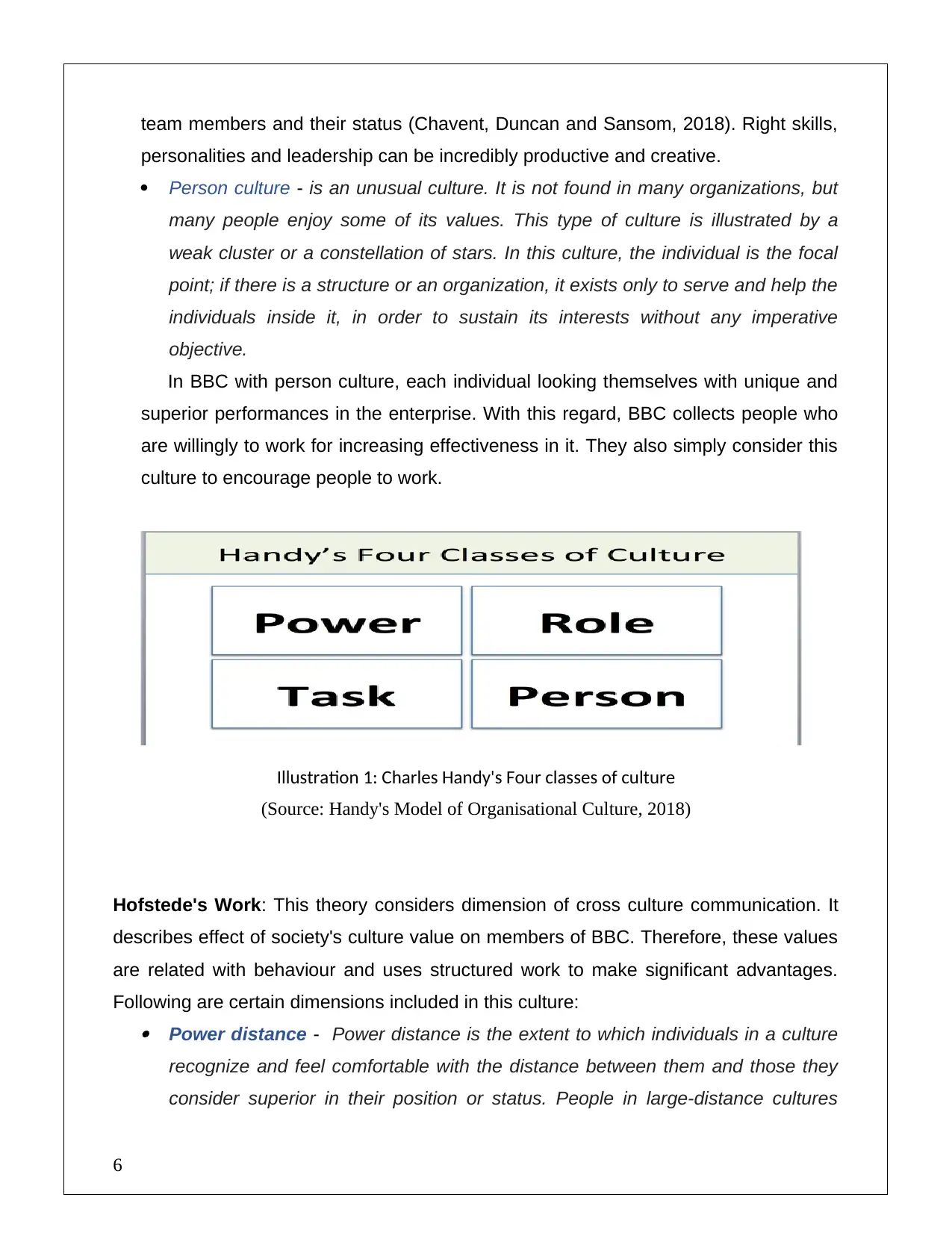
team members and their status (Chavent, Duncan and Sansom, 2018). Right skills,
personalities and leadership can be incredibly productive and creative.
Person culture - is an unusual culture. It is not found in many organizations, but
many people enjoy some of its values. This type of culture is illustrated by a
weak cluster or a constellation of stars. In this culture, the individual is the focal
point; if there is a structure or an organization, it exists only to serve and help the
individuals inside it, in order to sustain its interests without any imperative
objective.
In BBC with person culture, each individual looking themselves with unique and
superior performances in the enterprise. With this regard, BBC collects people who
are willingly to work for increasing effectiveness in it. They also simply consider this
culture to encourage people to work.
Illustration 1: Charles Handy's Four classes of culture
(Source: Handy's Model of Organisational Culture, 2018)
Hofstede's Work: This theory considers dimension of cross culture communication. It
describes effect of society's culture value on members of BBC. Therefore, these values
are related with behaviour and uses structured work to make significant advantages.
Following are certain dimensions included in this culture: Power distance - Power distance is the extent to which individuals in a culture
recognize and feel comfortable with the distance between them and those they
consider superior in their position or status. People in large-distance cultures
6
personalities and leadership can be incredibly productive and creative.
Person culture - is an unusual culture. It is not found in many organizations, but
many people enjoy some of its values. This type of culture is illustrated by a
weak cluster or a constellation of stars. In this culture, the individual is the focal
point; if there is a structure or an organization, it exists only to serve and help the
individuals inside it, in order to sustain its interests without any imperative
objective.
In BBC with person culture, each individual looking themselves with unique and
superior performances in the enterprise. With this regard, BBC collects people who
are willingly to work for increasing effectiveness in it. They also simply consider this
culture to encourage people to work.
Illustration 1: Charles Handy's Four classes of culture
(Source: Handy's Model of Organisational Culture, 2018)
Hofstede's Work: This theory considers dimension of cross culture communication. It
describes effect of society's culture value on members of BBC. Therefore, these values
are related with behaviour and uses structured work to make significant advantages.
Following are certain dimensions included in this culture: Power distance - Power distance is the extent to which individuals in a culture
recognize and feel comfortable with the distance between them and those they
consider superior in their position or status. People in large-distance cultures
6
⊘ This is a preview!⊘
Do you want full access?
Subscribe today to unlock all pages.

Trusted by 1+ million students worldwide
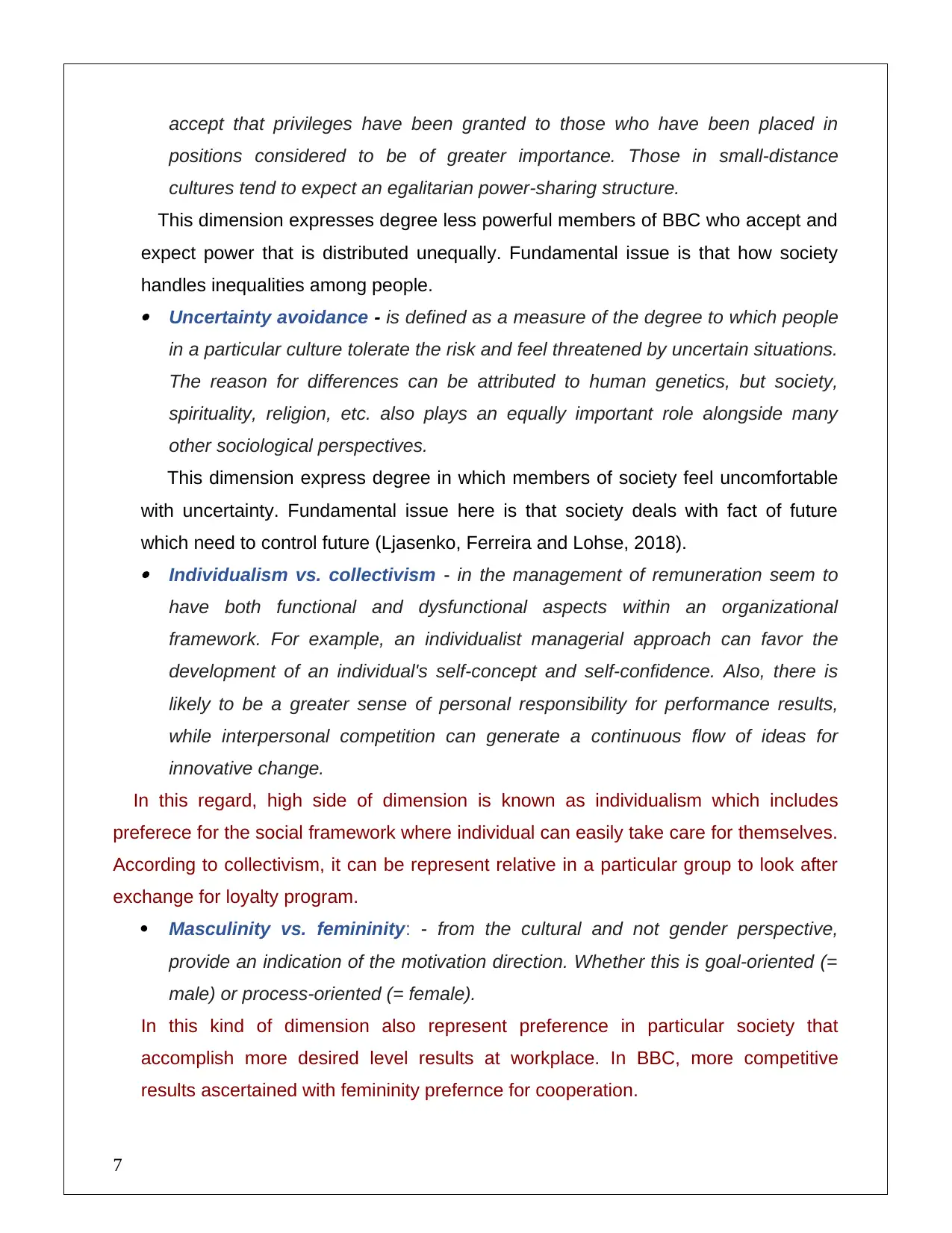
accept that privileges have been granted to those who have been placed in
positions considered to be of greater importance. Those in small-distance
cultures tend to expect an egalitarian power-sharing structure.
This dimension expresses degree less powerful members of BBC who accept and
expect power that is distributed unequally. Fundamental issue is that how society
handles inequalities among people. Uncertainty avoidance - is defined as a measure of the degree to which people
in a particular culture tolerate the risk and feel threatened by uncertain situations.
The reason for differences can be attributed to human genetics, but society,
spirituality, religion, etc. also plays an equally important role alongside many
other sociological perspectives.
This dimension express degree in which members of society feel uncomfortable
with uncertainty. Fundamental issue here is that society deals with fact of future
which need to control future (Ljasenko, Ferreira and Lohse, 2018). Individualism vs. collectivism - in the management of remuneration seem to
have both functional and dysfunctional aspects within an organizational
framework. For example, an individualist managerial approach can favor the
development of an individual's self-concept and self-confidence. Also, there is
likely to be a greater sense of personal responsibility for performance results,
while interpersonal competition can generate a continuous flow of ideas for
innovative change.
In this regard, high side of dimension is known as individualism which includes
preferece for the social framework where individual can easily take care for themselves.
According to collectivism, it can be represent relative in a particular group to look after
exchange for loyalty program.
Masculinity vs. femininity: - from the cultural and not gender perspective,
provide an indication of the motivation direction. Whether this is goal-oriented (=
male) or process-oriented (= female).
In this kind of dimension also represent preference in particular society that
accomplish more desired level results at workplace. In BBC, more competitive
results ascertained with femininity prefernce for cooperation.
7
positions considered to be of greater importance. Those in small-distance
cultures tend to expect an egalitarian power-sharing structure.
This dimension expresses degree less powerful members of BBC who accept and
expect power that is distributed unequally. Fundamental issue is that how society
handles inequalities among people. Uncertainty avoidance - is defined as a measure of the degree to which people
in a particular culture tolerate the risk and feel threatened by uncertain situations.
The reason for differences can be attributed to human genetics, but society,
spirituality, religion, etc. also plays an equally important role alongside many
other sociological perspectives.
This dimension express degree in which members of society feel uncomfortable
with uncertainty. Fundamental issue here is that society deals with fact of future
which need to control future (Ljasenko, Ferreira and Lohse, 2018). Individualism vs. collectivism - in the management of remuneration seem to
have both functional and dysfunctional aspects within an organizational
framework. For example, an individualist managerial approach can favor the
development of an individual's self-concept and self-confidence. Also, there is
likely to be a greater sense of personal responsibility for performance results,
while interpersonal competition can generate a continuous flow of ideas for
innovative change.
In this regard, high side of dimension is known as individualism which includes
preferece for the social framework where individual can easily take care for themselves.
According to collectivism, it can be represent relative in a particular group to look after
exchange for loyalty program.
Masculinity vs. femininity: - from the cultural and not gender perspective,
provide an indication of the motivation direction. Whether this is goal-oriented (=
male) or process-oriented (= female).
In this kind of dimension also represent preference in particular society that
accomplish more desired level results at workplace. In BBC, more competitive
results ascertained with femininity prefernce for cooperation.
7
Paraphrase This Document
Need a fresh take? Get an instant paraphrase of this document with our AI Paraphraser
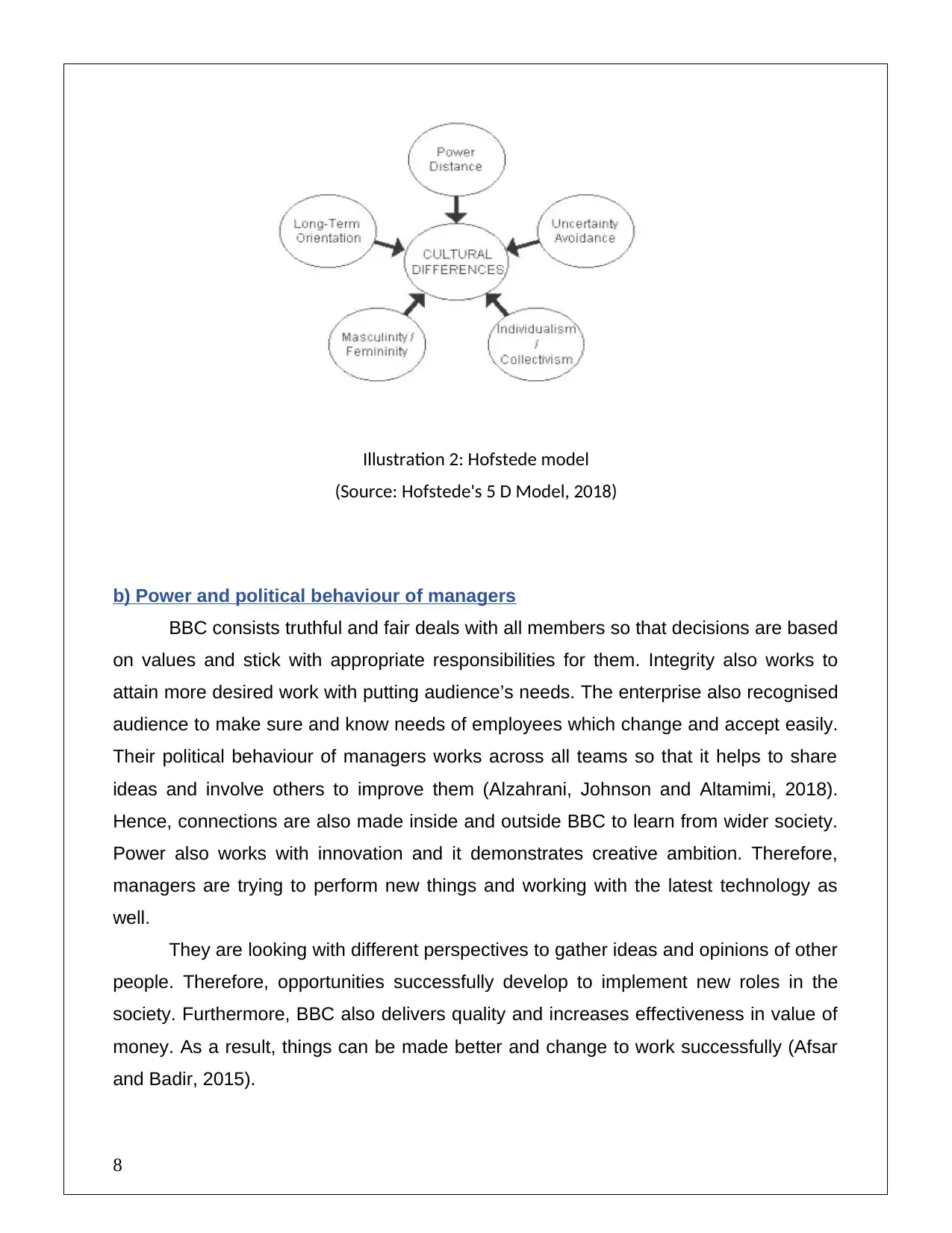
Illustration 2: Hofstede model
(Source: Hofstede's 5 D Model, 2018)
b) Power and political behaviour of managers
BBC consists truthful and fair deals with all members so that decisions are based
on values and stick with appropriate responsibilities for them. Integrity also works to
attain more desired work with putting audience’s needs. The enterprise also recognised
audience to make sure and know needs of employees which change and accept easily.
Their political behaviour of managers works across all teams so that it helps to share
ideas and involve others to improve them (Alzahrani, Johnson and Altamimi, 2018).
Hence, connections are also made inside and outside BBC to learn from wider society.
Power also works with innovation and it demonstrates creative ambition. Therefore,
managers are trying to perform new things and working with the latest technology as
well.
They are looking with different perspectives to gather ideas and opinions of other
people. Therefore, opportunities successfully develop to implement new roles in the
society. Furthermore, BBC also delivers quality and increases effectiveness in value of
money. As a result, things can be made better and change to work successfully (Afsar
and Badir, 2015).
8
(Source: Hofstede's 5 D Model, 2018)
b) Power and political behaviour of managers
BBC consists truthful and fair deals with all members so that decisions are based
on values and stick with appropriate responsibilities for them. Integrity also works to
attain more desired work with putting audience’s needs. The enterprise also recognised
audience to make sure and know needs of employees which change and accept easily.
Their political behaviour of managers works across all teams so that it helps to share
ideas and involve others to improve them (Alzahrani, Johnson and Altamimi, 2018).
Hence, connections are also made inside and outside BBC to learn from wider society.
Power also works with innovation and it demonstrates creative ambition. Therefore,
managers are trying to perform new things and working with the latest technology as
well.
They are looking with different perspectives to gather ideas and opinions of other
people. Therefore, opportunities successfully develop to implement new roles in the
society. Furthermore, BBC also delivers quality and increases effectiveness in value of
money. As a result, things can be made better and change to work successfully (Afsar
and Badir, 2015).
8
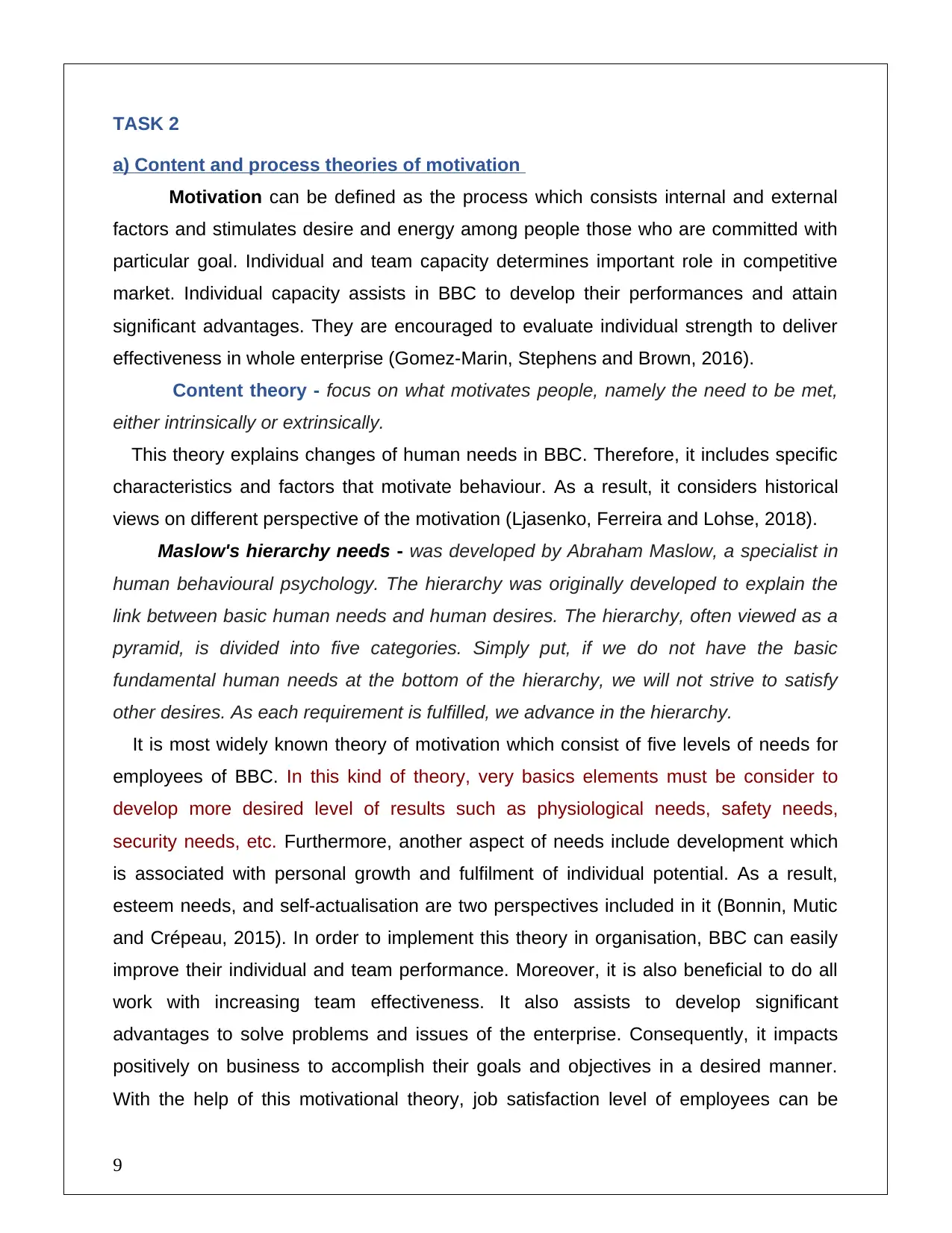
TASK 2
a) Content and process theories of motivation
Motivation can be defined as the process which consists internal and external
factors and stimulates desire and energy among people those who are committed with
particular goal. Individual and team capacity determines important role in competitive
market. Individual capacity assists in BBC to develop their performances and attain
significant advantages. They are encouraged to evaluate individual strength to deliver
effectiveness in whole enterprise (Gomez-Marin, Stephens and Brown, 2016).
Content theory - focus on what motivates people, namely the need to be met,
either intrinsically or extrinsically.
This theory explains changes of human needs in BBC. Therefore, it includes specific
characteristics and factors that motivate behaviour. As a result, it considers historical
views on different perspective of the motivation (Ljasenko, Ferreira and Lohse, 2018).
Maslow's hierarchy needs - was developed by Abraham Maslow, a specialist in
human behavioural psychology. The hierarchy was originally developed to explain the
link between basic human needs and human desires. The hierarchy, often viewed as a
pyramid, is divided into five categories. Simply put, if we do not have the basic
fundamental human needs at the bottom of the hierarchy, we will not strive to satisfy
other desires. As each requirement is fulfilled, we advance in the hierarchy.
It is most widely known theory of motivation which consist of five levels of needs for
employees of BBC. In this kind of theory, very basics elements must be consider to
develop more desired level of results such as physiological needs, safety needs,
security needs, etc. Furthermore, another aspect of needs include development which
is associated with personal growth and fulfilment of individual potential. As a result,
esteem needs, and self-actualisation are two perspectives included in it (Bonnin, Mutic
and Crépeau, 2015). In order to implement this theory in organisation, BBC can easily
improve their individual and team performance. Moreover, it is also beneficial to do all
work with increasing team effectiveness. It also assists to develop significant
advantages to solve problems and issues of the enterprise. Consequently, it impacts
positively on business to accomplish their goals and objectives in a desired manner.
With the help of this motivational theory, job satisfaction level of employees can be
9
a) Content and process theories of motivation
Motivation can be defined as the process which consists internal and external
factors and stimulates desire and energy among people those who are committed with
particular goal. Individual and team capacity determines important role in competitive
market. Individual capacity assists in BBC to develop their performances and attain
significant advantages. They are encouraged to evaluate individual strength to deliver
effectiveness in whole enterprise (Gomez-Marin, Stephens and Brown, 2016).
Content theory - focus on what motivates people, namely the need to be met,
either intrinsically or extrinsically.
This theory explains changes of human needs in BBC. Therefore, it includes specific
characteristics and factors that motivate behaviour. As a result, it considers historical
views on different perspective of the motivation (Ljasenko, Ferreira and Lohse, 2018).
Maslow's hierarchy needs - was developed by Abraham Maslow, a specialist in
human behavioural psychology. The hierarchy was originally developed to explain the
link between basic human needs and human desires. The hierarchy, often viewed as a
pyramid, is divided into five categories. Simply put, if we do not have the basic
fundamental human needs at the bottom of the hierarchy, we will not strive to satisfy
other desires. As each requirement is fulfilled, we advance in the hierarchy.
It is most widely known theory of motivation which consist of five levels of needs for
employees of BBC. In this kind of theory, very basics elements must be consider to
develop more desired level of results such as physiological needs, safety needs,
security needs, etc. Furthermore, another aspect of needs include development which
is associated with personal growth and fulfilment of individual potential. As a result,
esteem needs, and self-actualisation are two perspectives included in it (Bonnin, Mutic
and Crépeau, 2015). In order to implement this theory in organisation, BBC can easily
improve their individual and team performance. Moreover, it is also beneficial to do all
work with increasing team effectiveness. It also assists to develop significant
advantages to solve problems and issues of the enterprise. Consequently, it impacts
positively on business to accomplish their goals and objectives in a desired manner.
With the help of this motivational theory, job satisfaction level of employees can be
9
⊘ This is a preview!⊘
Do you want full access?
Subscribe today to unlock all pages.

Trusted by 1+ million students worldwide
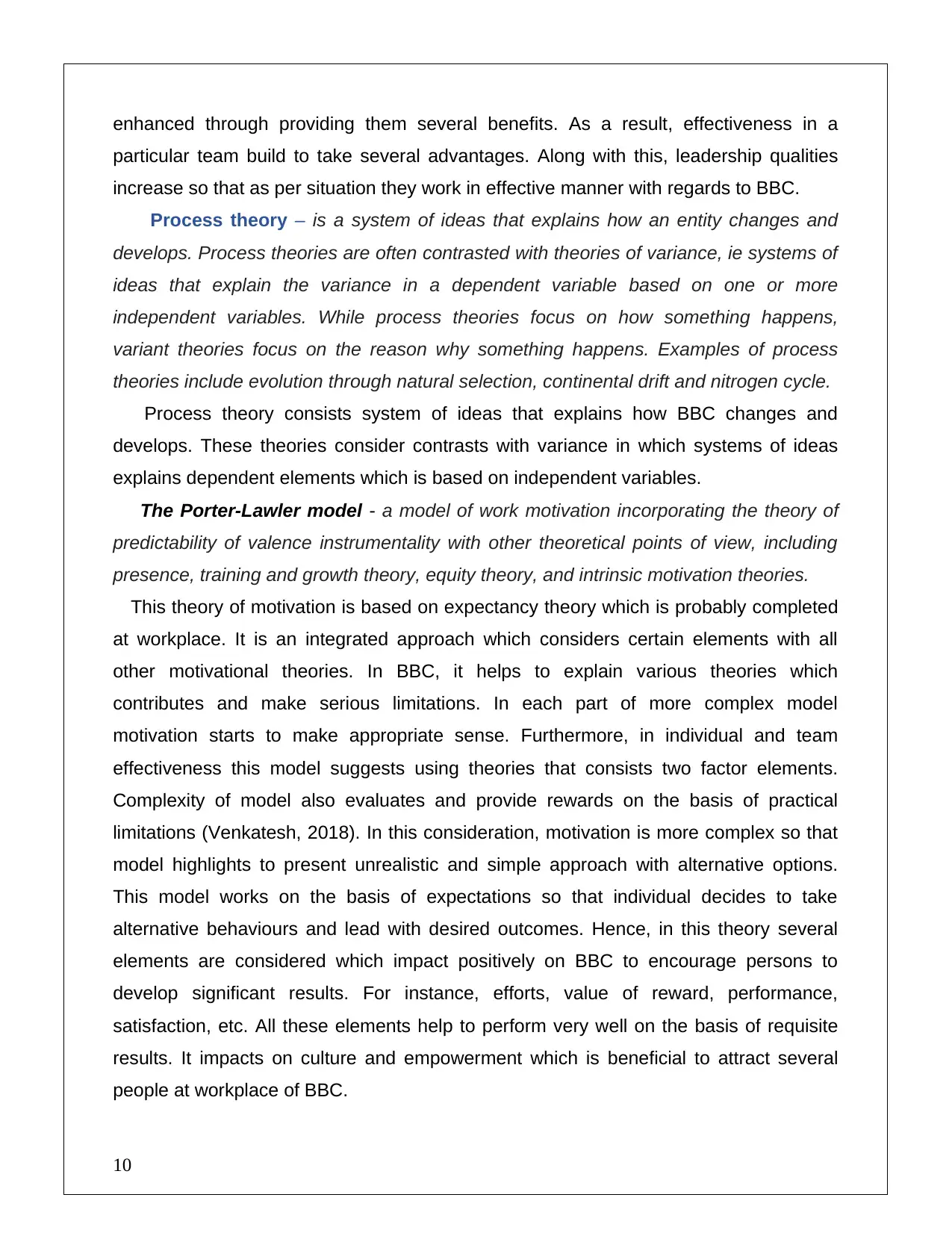
enhanced through providing them several benefits. As a result, effectiveness in a
particular team build to take several advantages. Along with this, leadership qualities
increase so that as per situation they work in effective manner with regards to BBC.
Process theory – is a system of ideas that explains how an entity changes and
develops. Process theories are often contrasted with theories of variance, ie systems of
ideas that explain the variance in a dependent variable based on one or more
independent variables. While process theories focus on how something happens,
variant theories focus on the reason why something happens. Examples of process
theories include evolution through natural selection, continental drift and nitrogen cycle.
Process theory consists system of ideas that explains how BBC changes and
develops. These theories consider contrasts with variance in which systems of ideas
explains dependent elements which is based on independent variables.
The Porter-Lawler model - a model of work motivation incorporating the theory of
predictability of valence instrumentality with other theoretical points of view, including
presence, training and growth theory, equity theory, and intrinsic motivation theories.
This theory of motivation is based on expectancy theory which is probably completed
at workplace. It is an integrated approach which considers certain elements with all
other motivational theories. In BBC, it helps to explain various theories which
contributes and make serious limitations. In each part of more complex model
motivation starts to make appropriate sense. Furthermore, in individual and team
effectiveness this model suggests using theories that consists two factor elements.
Complexity of model also evaluates and provide rewards on the basis of practical
limitations (Venkatesh, 2018). In this consideration, motivation is more complex so that
model highlights to present unrealistic and simple approach with alternative options.
This model works on the basis of expectations so that individual decides to take
alternative behaviours and lead with desired outcomes. Hence, in this theory several
elements are considered which impact positively on BBC to encourage persons to
develop significant results. For instance, efforts, value of reward, performance,
satisfaction, etc. All these elements help to perform very well on the basis of requisite
results. It impacts on culture and empowerment which is beneficial to attract several
people at workplace of BBC.
10
particular team build to take several advantages. Along with this, leadership qualities
increase so that as per situation they work in effective manner with regards to BBC.
Process theory – is a system of ideas that explains how an entity changes and
develops. Process theories are often contrasted with theories of variance, ie systems of
ideas that explain the variance in a dependent variable based on one or more
independent variables. While process theories focus on how something happens,
variant theories focus on the reason why something happens. Examples of process
theories include evolution through natural selection, continental drift and nitrogen cycle.
Process theory consists system of ideas that explains how BBC changes and
develops. These theories consider contrasts with variance in which systems of ideas
explains dependent elements which is based on independent variables.
The Porter-Lawler model - a model of work motivation incorporating the theory of
predictability of valence instrumentality with other theoretical points of view, including
presence, training and growth theory, equity theory, and intrinsic motivation theories.
This theory of motivation is based on expectancy theory which is probably completed
at workplace. It is an integrated approach which considers certain elements with all
other motivational theories. In BBC, it helps to explain various theories which
contributes and make serious limitations. In each part of more complex model
motivation starts to make appropriate sense. Furthermore, in individual and team
effectiveness this model suggests using theories that consists two factor elements.
Complexity of model also evaluates and provide rewards on the basis of practical
limitations (Venkatesh, 2018). In this consideration, motivation is more complex so that
model highlights to present unrealistic and simple approach with alternative options.
This model works on the basis of expectations so that individual decides to take
alternative behaviours and lead with desired outcomes. Hence, in this theory several
elements are considered which impact positively on BBC to encourage persons to
develop significant results. For instance, efforts, value of reward, performance,
satisfaction, etc. All these elements help to perform very well on the basis of requisite
results. It impacts on culture and empowerment which is beneficial to attract several
people at workplace of BBC.
10
Paraphrase This Document
Need a fresh take? Get an instant paraphrase of this document with our AI Paraphraser
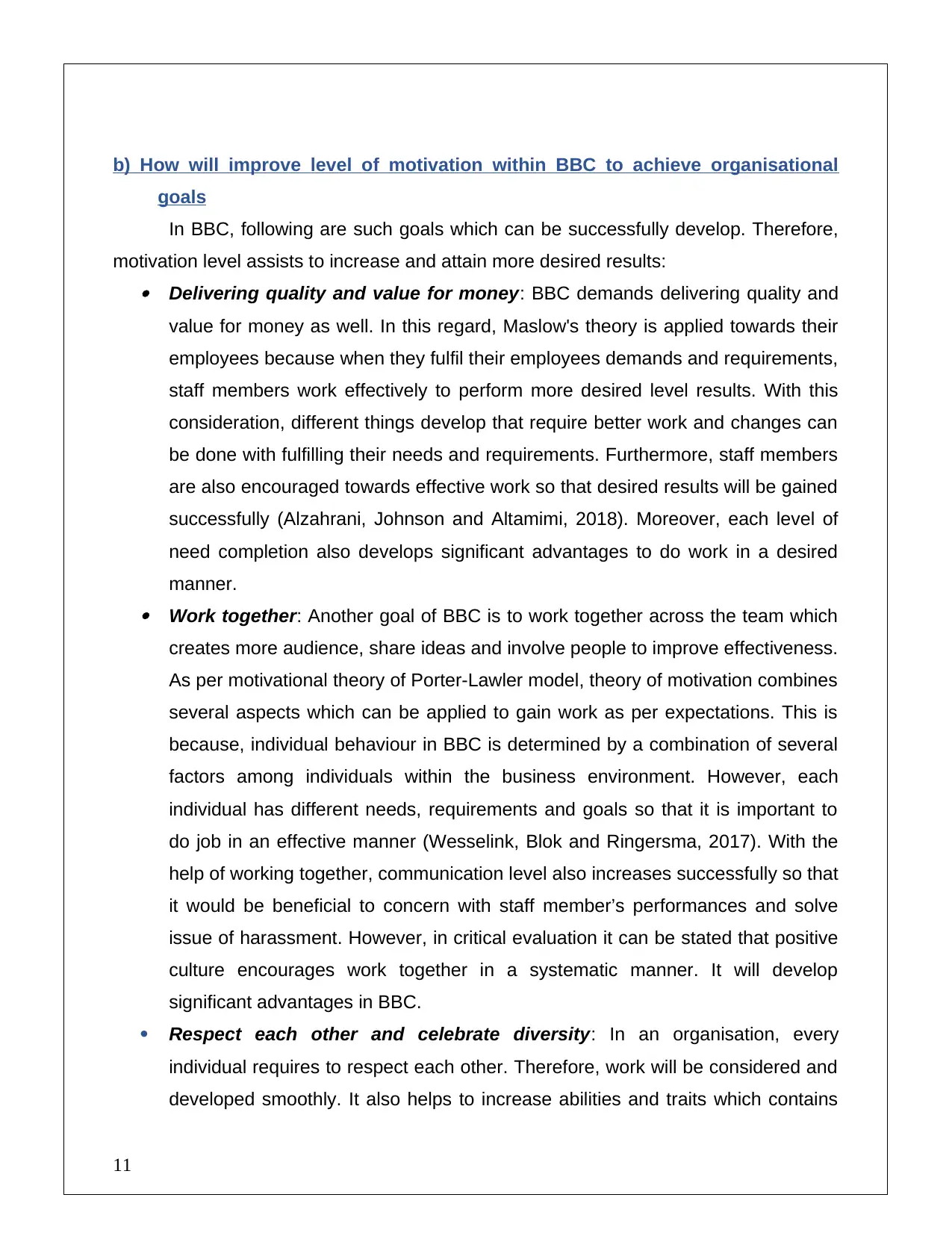
b) How will improve level of motivation within BBC to achieve organisational
goals
In BBC, following are such goals which can be successfully develop. Therefore,
motivation level assists to increase and attain more desired results: Delivering quality and value for money: BBC demands delivering quality and
value for money as well. In this regard, Maslow's theory is applied towards their
employees because when they fulfil their employees demands and requirements,
staff members work effectively to perform more desired level results. With this
consideration, different things develop that require better work and changes can
be done with fulfilling their needs and requirements. Furthermore, staff members
are also encouraged towards effective work so that desired results will be gained
successfully (Alzahrani, Johnson and Altamimi, 2018). Moreover, each level of
need completion also develops significant advantages to do work in a desired
manner. Work together: Another goal of BBC is to work together across the team which
creates more audience, share ideas and involve people to improve effectiveness.
As per motivational theory of Porter-Lawler model, theory of motivation combines
several aspects which can be applied to gain work as per expectations. This is
because, individual behaviour in BBC is determined by a combination of several
factors among individuals within the business environment. However, each
individual has different needs, requirements and goals so that it is important to
do job in an effective manner (Wesselink, Blok and Ringersma, 2017). With the
help of working together, communication level also increases successfully so that
it would be beneficial to concern with staff member’s performances and solve
issue of harassment. However, in critical evaluation it can be stated that positive
culture encourages work together in a systematic manner. It will develop
significant advantages in BBC.
Respect each other and celebrate diversity: In an organisation, every
individual requires to respect each other. Therefore, work will be considered and
developed smoothly. It also helps to increase abilities and traits which contains
11
goals
In BBC, following are such goals which can be successfully develop. Therefore,
motivation level assists to increase and attain more desired results: Delivering quality and value for money: BBC demands delivering quality and
value for money as well. In this regard, Maslow's theory is applied towards their
employees because when they fulfil their employees demands and requirements,
staff members work effectively to perform more desired level results. With this
consideration, different things develop that require better work and changes can
be done with fulfilling their needs and requirements. Furthermore, staff members
are also encouraged towards effective work so that desired results will be gained
successfully (Alzahrani, Johnson and Altamimi, 2018). Moreover, each level of
need completion also develops significant advantages to do work in a desired
manner. Work together: Another goal of BBC is to work together across the team which
creates more audience, share ideas and involve people to improve effectiveness.
As per motivational theory of Porter-Lawler model, theory of motivation combines
several aspects which can be applied to gain work as per expectations. This is
because, individual behaviour in BBC is determined by a combination of several
factors among individuals within the business environment. However, each
individual has different needs, requirements and goals so that it is important to
do job in an effective manner (Wesselink, Blok and Ringersma, 2017). With the
help of working together, communication level also increases successfully so that
it would be beneficial to concern with staff member’s performances and solve
issue of harassment. However, in critical evaluation it can be stated that positive
culture encourages work together in a systematic manner. It will develop
significant advantages in BBC.
Respect each other and celebrate diversity: In an organisation, every
individual requires to respect each other. Therefore, work will be considered and
developed smoothly. It also helps to increase abilities and traits which contains
11
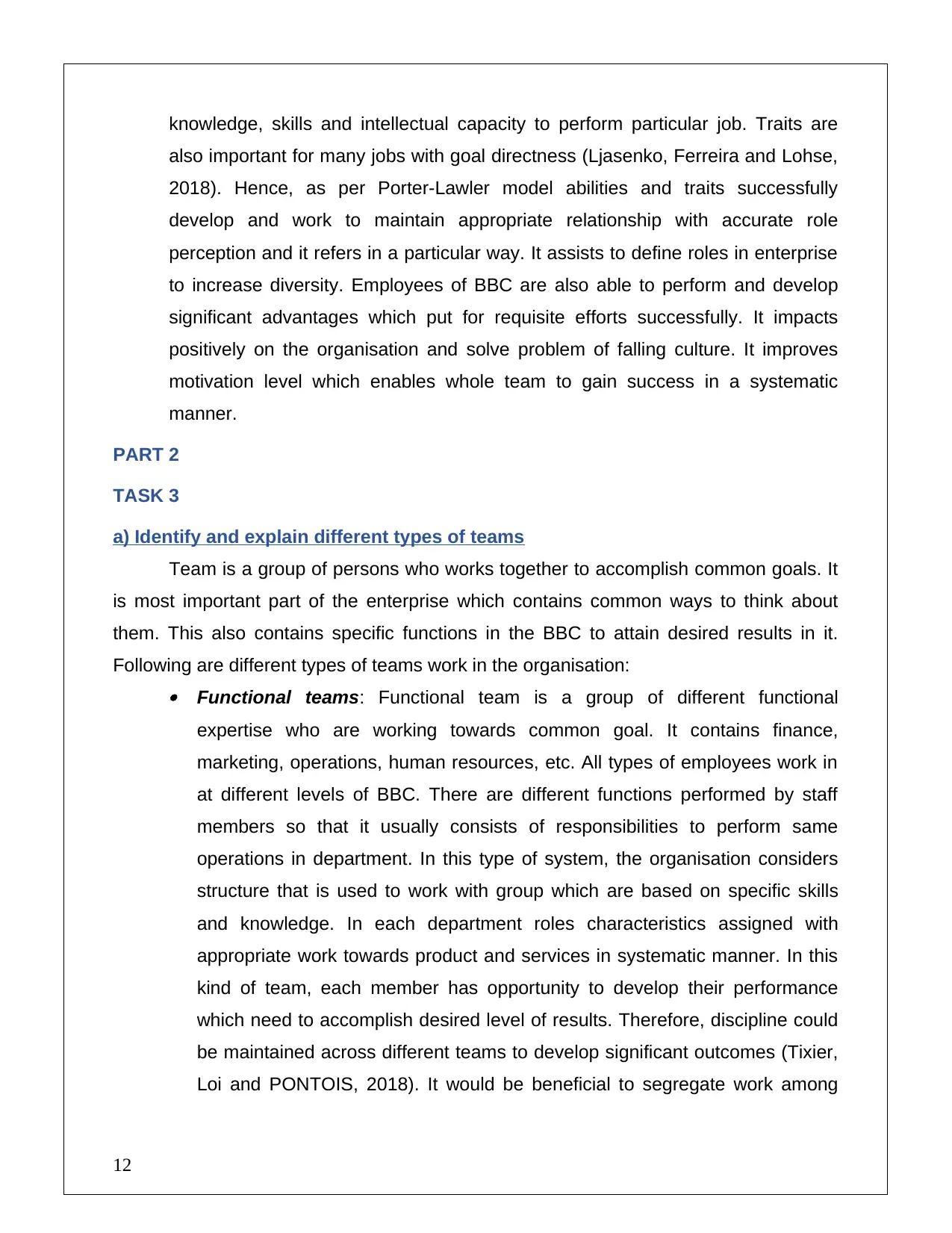
knowledge, skills and intellectual capacity to perform particular job. Traits are
also important for many jobs with goal directness (Ljasenko, Ferreira and Lohse,
2018). Hence, as per Porter-Lawler model abilities and traits successfully
develop and work to maintain appropriate relationship with accurate role
perception and it refers in a particular way. It assists to define roles in enterprise
to increase diversity. Employees of BBC are also able to perform and develop
significant advantages which put for requisite efforts successfully. It impacts
positively on the organisation and solve problem of falling culture. It improves
motivation level which enables whole team to gain success in a systematic
manner.
PART 2
TASK 3
a) Identify and explain different types of teams
Team is a group of persons who works together to accomplish common goals. It
is most important part of the enterprise which contains common ways to think about
them. This also contains specific functions in the BBC to attain desired results in it.
Following are different types of teams work in the organisation:
Functional teams: Functional team is a group of different functional
expertise who are working towards common goal. It contains finance,
marketing, operations, human resources, etc. All types of employees work in
at different levels of BBC. There are different functions performed by staff
members so that it usually consists of responsibilities to perform same
operations in department. In this type of system, the organisation considers
structure that is used to work with group which are based on specific skills
and knowledge. In each department roles characteristics assigned with
appropriate work towards product and services in systematic manner. In this
kind of team, each member has opportunity to develop their performance
which need to accomplish desired level of results. Therefore, discipline could
be maintained across different teams to develop significant outcomes (Tixier,
Loi and PONTOIS, 2018). It would be beneficial to segregate work among
12
also important for many jobs with goal directness (Ljasenko, Ferreira and Lohse,
2018). Hence, as per Porter-Lawler model abilities and traits successfully
develop and work to maintain appropriate relationship with accurate role
perception and it refers in a particular way. It assists to define roles in enterprise
to increase diversity. Employees of BBC are also able to perform and develop
significant advantages which put for requisite efforts successfully. It impacts
positively on the organisation and solve problem of falling culture. It improves
motivation level which enables whole team to gain success in a systematic
manner.
PART 2
TASK 3
a) Identify and explain different types of teams
Team is a group of persons who works together to accomplish common goals. It
is most important part of the enterprise which contains common ways to think about
them. This also contains specific functions in the BBC to attain desired results in it.
Following are different types of teams work in the organisation:
Functional teams: Functional team is a group of different functional
expertise who are working towards common goal. It contains finance,
marketing, operations, human resources, etc. All types of employees work in
at different levels of BBC. There are different functions performed by staff
members so that it usually consists of responsibilities to perform same
operations in department. In this type of system, the organisation considers
structure that is used to work with group which are based on specific skills
and knowledge. In each department roles characteristics assigned with
appropriate work towards product and services in systematic manner. In this
kind of team, each member has opportunity to develop their performance
which need to accomplish desired level of results. Therefore, discipline could
be maintained across different teams to develop significant outcomes (Tixier,
Loi and PONTOIS, 2018). It would be beneficial to segregate work among
12
⊘ This is a preview!⊘
Do you want full access?
Subscribe today to unlock all pages.

Trusted by 1+ million students worldwide
1 out of 22
Related Documents
Your All-in-One AI-Powered Toolkit for Academic Success.
+13062052269
info@desklib.com
Available 24*7 on WhatsApp / Email
![[object Object]](/_next/static/media/star-bottom.7253800d.svg)
Unlock your academic potential
Copyright © 2020–2026 A2Z Services. All Rights Reserved. Developed and managed by ZUCOL.





